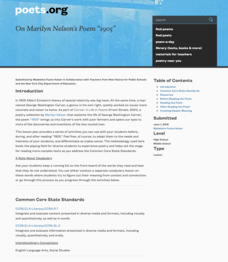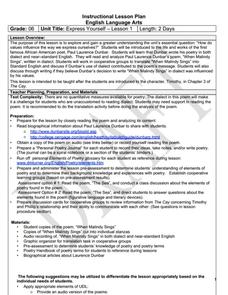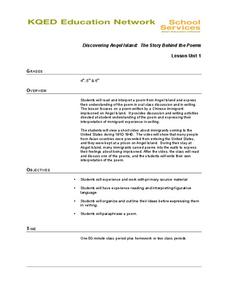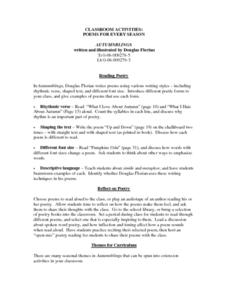Curated OER
Poetry Coffeehouse
This resource contains a vague plan for a poetry unit conducted at an elementary school during the month of February. Although this plan does not included detailed instructional strategies, this does outline a basic unit, some creative...
Academy of American Poets
Teach This Poem: “In This Place (An American Lyric)” by Amanda Gorman
Amanda Gorman, the United States's first National Youth Poet Laureate, is featured in a resource from the Academy of American Poets. Class members first read Dr. Martin Luther King, Jr.'s "I Have A Dream" speech and note what King wanted...
Academy of American Poets
Teach This Poem: "The Tradition" by Jericho Brown
To begin this lesson, class members examine Antonius Hockelmann's painting "Tree Flowers II," record elements of the painting that they notice, and share their observations with a partner. Next, pupils do a close reading of Jericho...
Academy of American Poets
Teach This Poem: "Violin" by Nikki Wallschlaeger
Nikki Wallschlaeger's Violin is the featured poem in a instructional activity that uses music and multiple readings to delve deep into its analysis. After a writing warm-up, learners watch and listen to a video that showcases Regina...
Academy of American Poets
Teach This Poem: “As I Walk These Broad Majestic Days” by Walt Whitman
Walt Whitman's poem "As I Walk These Broad Majestic Days" offers scholars an opportunity to practice their noticing skills. They first examine a postcard of the Newport News Shipyard listing things they notice about the image and how...
Academy of American Poets
On Marilyn Nelson's Poem “1905”
Marilyn Nelson's poem, "1905," asks young scholars to compare and contrast George Washington Carver and Albert Einstein. After studying images of the two scientists and listing their observations, class members listen to several readings...
Academy of American Poets
Teach This Poem: “One day is there of the series” by Emily Dickinson
A lesson begins with learners saying three words they associate with Thanksgiving dinner. They examine a picture of a menu from a Thanksgiving meal and discuss what they believe the artist wants them to feel, pointing out details. Small...
National Park Service
The Poet's Toolbox
If you need a lesson for your poetry unit, use two poems by Henry Wadsworth Longfellow ("Rain in Summer" and "The Slave in the Dismal Swamp") and a resource on Elements of Poetry. The lesson plan guides you through activities on...
Curated OER
6th Grade: Express Yourself, Lesson 1: Poem
While originally created to accompany The Cay, this poetry lesson could be used on it's own, especially if you are working on dialect. Class members conduct a close reading of "When Malindy Sings" by Paul Laurence Dunbar and listen to an...
EngageNY
Seeing, Hearing, and Comparing Genres: A Poem and a Letter
One can never be too prepared. Pupils prepare for their upcoming mid-unit assessment by writing their group norms for small group discussions. Additionally, scholars read and listen to a poem, comparing the two experiences using a Venn...
Academy of American Poets
Teach This Poem: "Maps" by Yesenia Montilla
After examining a physical map of the world, learners conduct a close reading of Yesenia Montilla's poem "Maps." They note the interesting words and phrases, the way the poem is structured, and list questions they might have. After...
Curated OER
Everyone Can Write Poetry
Embark on a journey of writing several different types of poetry. Fifth graders read several examples, and use the examples to model their own writing. Each poem is to be accompanied by a different art visual representation. In the end,...
Curated OER
Reading Poetry in the Middle Grades
Bring the beauty of "Nothing Gold Can Stay" by Robert Frost to middle school language arts. After learners read a copy of the poem, they follow an instructional sequence that focuses on sound, figurative language, and theme.
Curated OER
Discovering Angel Island: The Story Behind the Poems
Poems carved into the wooden walls of the Asian immigrant prisons on Angel Island provide upper elementary graders an opportunity to study not only the story behind the poems but to also focus on the figurative language employed by the...
Curated OER
So Much Depends Upon...Sixteen-Word Imagery Poems Inspired by Love that Dog by Sharon Creech
After reading Love That Dog by Sharon Creech (and possibly shedding a few tears), middle schoolers work on their own sixteen-word poems with a Six Trait writing activity. They focus on word choice in this activity to capture an...
Curated OER
Introduction to the Poetry Unit
Young scholars explore, analyze and interpret one form of poetry writing called Poetry Slam. They hear several examples of unexpected poetry and view a video of "Slam Nation." The books, "Hey You! C'mere: A Poetry Slam," by Elizabeth...
EngageNY
Mid-Unit Assessment: Small Group Discussion: How Do Modern Poems Portray Modern Adversities?
How is a poem similar to and different from a news article? Pupils use a graphic organizer to compare and contrast the two genres. Also, as part of a mid-unit assessment, scholars participate in small-group discussions based on poetry...
Curated OER
Poems for Every Season
Young scholars read and explore autumn poetry. In this poetry lesson, students read Autumnblings and are introduced to different poetic forms. Lesson includes ideas for exploring the poetic forms presented in the book and...
Curated OER
Teaching Selected Poems from Jim Wayne Miller's the Brier Poems
Learners explore the basic elements of poetry through Appalachian life poetry. For this poetry lesson, students read seven poems from Jim Wayne Miller's the Brier Poems and complete poetry analysis activities for each poem.
Scholastic
Reading Poems From the Academy of American Poets Chancellors
Start a lesson on poetic voice with a peer to peer discussion on what characterizes the strength in the voice with which a writer chooses to express himself/herself. In pairs, readers are tasked with reading and creating T-charts for...
National Endowment for the Humanities
“The Great Migration” by Minnie Bruce Pratt
Minnie Bruce Pratt's poem, "The Great Migration," offers young scholars an opportunity to reflect on how where we come from influences who we are. Groups conduct a close reading of the poem, recording observations about the poem's...
Scholastic
Selecting Favorite Poems From Historical Poets
Here is a poetry lesson that begins with a free-association activity focused on the word voice. Learners each sit alone for a moment and make sounds that express how they are currently feeling, and then turn to their partners to share...
National Endowment for the Humanities
“Every Day We Get More Illegal” by Juan Felipe Herrera
A study of Jan Felipe Herrera's poem "Every Day We Get More Illegal" opens the door for a discussion on immigration. To begin, class members examine the photograph "Desert Survival," record their observations of the image, and then...
Learning for Justice
Maya Angelou
Maya Angelou's poem, "Still I Rise", offers young scholars an opportunity to consider how poets use literary devices to create powerful messages. After a close reading and discussion of the poem, class members reflect on how they can...
Other popular searches
- 6th Grade Poetry Unit
- 2nd Grade Poetry Unit
- 3rd Grade Poetry Unit
- 7th Grade Poetry Unit
- 5th Grade Poetry Unit
- Poetry Unit Plans
- Poetry Unit Grade Three
- Modern Poetry Unit
- Poetry Unit Rhyme
- Huge Poetry Unit
- African American Poetry Unit
- Poetry Unit Jack Prelutsky

























